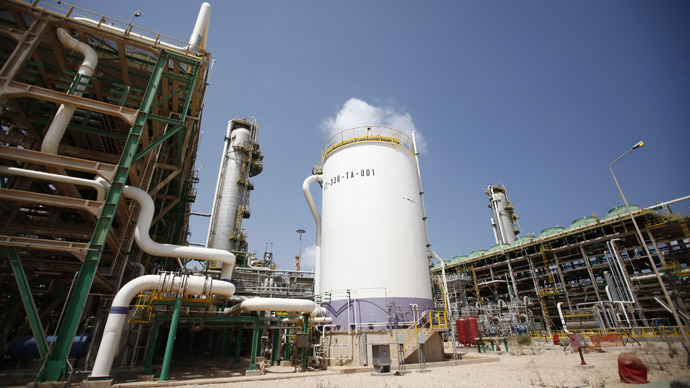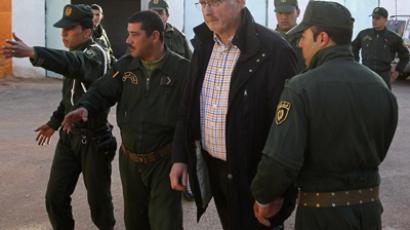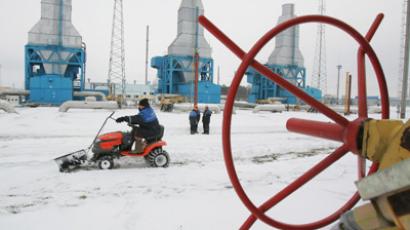Libyan gas exports to Italy disrupted due to clashes

Combat between groups of former rebel fighters in Libya brought a halt to the country’s natural gas exports to Italy, as security concerns forced energy giant ENI to temporarily shut down the key Greenstream pipeline connecting Libya and Sicily.
Mellitah oil and gas complex near Zwara, west of Tripoli – ENI’s
major facility in is the region – had to stop gas exports on
Saturday after the guards of the complex quarreled with a group of
local militia. The argument escalated into a firefight, and a staff
member reportedly was injured. Authorities at the complex had to
stop production, though none of the pipelines were damaged.
“Gas exports have been completely halted," Mustafa
Sunalla, deputy chair of Libya’s National Oil Corporation (NOC),
announced on Sunday. ENI, Italy's largest energy company, is
operating in Libya in a joint venture with NOC.
Libya’s Deputy Defense Minister Khalid Sharif announced later on Sunday that despite the temporary disruption, work had resumed at the complex, The Libya Herald reports.
Sharif also said the flow of traffic on the main coastal road from Tripoli to Tunisia had returned to normal.

ENI’s Mellitah complex produces about 115,000 barrels of oils
equivalent daily, Reuters reports.
The gas from the Mellitah complex is pumped through Greenstream
to Gela, in Sicily. The pipeline delivers about 9 billion cubic
meters of natural gas annually – nearly 11 percent of Italy's total
national gas consumption.
In mid-February, Libya celebrated the two year anniversary of
the beginning of the uprising that ousted the country’s strongman
leader Colonel Muammar Gaddafi in October 2011.
Libyan society has become fractured after the new government
failed to make progress in solving the country’s most urgent
problems, like creating jobs and disarming local militias
extrajudicial to country’s authorities.
Clashes between armed groups have become a regular occurrence in
the country as local tribes fight to seize control of areas or take control of profitable businesses.
Libyan Prime Minister Ali Zidan promised during a police
graduation ceremony in Tripoli last Thursday that he “will not
permit hijacking of Tripoli or Benghazi or any other city,” and
called on militias to evacuate their buildings and
headquarters.
Newly appointed Libyan Interior Minister Ashour Shwayel reported that the number of policemen in the country has reached 120,000, and continues to grow. On Sunday, Al Arabiya reported that RPG missiles were launched at the Libyan National Congress’ headquarters.

‘NATO can’t fill Libya’s political vacuum’
Saturday’s firefight and subsequent disruption in gas exports is symptomatic of Libya’s weak national political system following the Western campaign to oust Muammar Gaddafi, Abayomi Azikiwe from the Pan-African News Wire told RT.
“The transnational corporations are only concerned about the extraction of oil as well as natural gas from the country. They’re doing very little to stabilize the situation politically. And because of the lack of a cohesive political framework, the government has been incapable of bringing about any kind of stability,” he argues.
Azikiwe argues that Western efforts to privatize Libya’s oil and natural gas industry is occurring at a time when the country’s lack of political cohesiveness will only guarantee such incidents will happen again in the future.
“Of course, the majority of Libyans are suffering immensely as a result of this post-Gaddafi political configuration. As we’ve seen, the clashes between the various militia groups as well as the so-called army that is ostensibly under the control of the General National Congress [GNC] is still not in a situation where it can bring about stability,” he said.
“And if you don’t have a cohesive ideology, if you don’t have a general framework for building a national political system, you are going to have these problems,” Azikiwe continued.
“Now, the GNC is requesting that the US and other NATO countries come in and help them secure the borders, help them train their military forces, but this in and of itself cannot serve as a substitute for a lack of political cohesiveness.”















